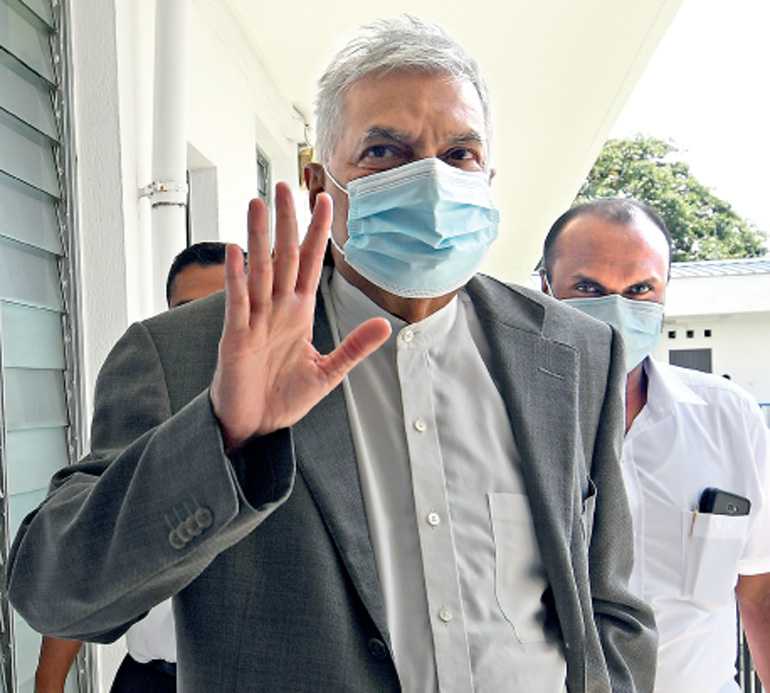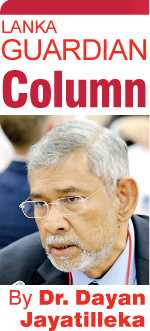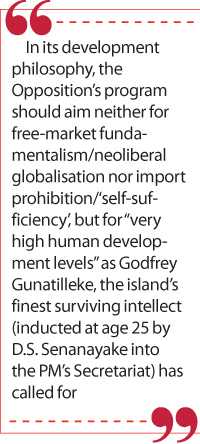Sunday Feb 15, 2026
Sunday Feb 15, 2026
Thursday, 3 September 2020 00:20 - - {{hitsCtrl.values.hits}}

JR’s axiom was destroyed by Ranil Wickremesinghe who ruined the UNP far beyond the point that any of its great leaders ever thought it would or could be wrecked. It was not the Rajapaksas but Ranil who has reduced the UNP to rubble – Pic by Shehan Gunasekara
A successful strategy for the Opposition will have to contain three components: a lucid grasp of present oppositional realities and past errors, the ‘best practices’ of Oppositions – and comebacks in pertinent/related fields of endeavour—in the island’s contemporary history, as well as the best practices of Oppositions in contemporary world politics. 
‘Facts as They Are’ was the translation of the title of a booklet (‘Athi Thathu’) authored by R. Premadasa, aged 31, and published by MD Gunasena in 1955. Taking a cue from him, facts should be grasped not as one thinks or wishes they are, but as they really are.
The Opposition has to grasp that what has taken place in 2019-2020 is not a ‘wave’ as in 2015, which will inevitably flow back. It is not a mood, though it partly is. It is an existential decision, though not all of it is. It is a tectonic shift in Sinhala-Buddhist and probably pan-Sinhala consciousness, which will never return to 2015, even in the direst economic circumstances, just as Russia will never go back to the Gorbachev-Yeltsin 1990s.
The shift is not basically a matter of ethno-religious chauvinism—that is the dark, toxic froth; the excrescence. Beneath the chauvinist excrescence, it is basically a matter of political nationalism, reacting (as Russians did) to a perceived weakening of the state through neoliberal reform. Nationalism is defensive and legitimate, while chauvinism is aggressive, offensive.
In 2018-9, the Alt-Right axis, namely Viyath Maga-Eliya-Yuthukama and the local FOX News, distorted and diverted the populist-nationalism of the 2015-2017 MR/JO surge, pumping in toxicity (from ‘infertility pills’ to ‘Dr. Shafi and The Tying of the Fallopian Tubes of 4000 Sinhala Women’). ‘Radio Bemba’-type propaganda was spiked with ‘instinctual fascistic’ messaging and personality cult-building (as US critics say of FOX and the ‘Trump cult’).
To re-engineer and re-direct the undergirding Sinhala nationalist-populist shift, the Opposition has to meet that shift partway (as Ranasinghe Premadasa did) or remain in limbo (as Ranil did).
Suicide, not homicide
The Yahapalanaya-2015 bloc has been savaged by the citizen-voter as ‘The Punisher’: the UNP eliminated, the JVP almost so, and the TNA compacted. Sirisena’s SLFP barely survived.
When the Soviet Union imploded, creating the ‘unipolar moment’ in world politics, Fidel Castro’s verdict was that “it was suicide, not homicide”. JRJ’s axiom that no party can win a two-thirds majority under Proportional Representation was not shattered primarily by Basil Rajapaksa’s political genius-- which places him in a higher category than JRJ in a new hagiographical account, a ‘Basil’s Election’ version of ‘Gota’s War’ (reposted on LankaCNews), doubtless with succession in mind. JR’s axiom was destroyed by Ranil Wickremesinghe who ruined the UNP far beyond the point that any of its great leaders ever thought it would or could be wrecked. It was not the Rajapaksas but Ranil who has reduced the UNP to rubble.
The only ruling party that suffered such a fate of historic displacement and diminution (but never to that extent) was the UK’s Liberal Party. History proved it irreversible. The only future for the UNP is in a classic Lab-Lib formula, with the SJB as Labour and the UNP as the Liberals.
How and why did the UNP, the party of the founding of the independent state of Ceylon, the party of the great ‘Presidentialist-statists’ JR Jayewardene and Ranasinghe Premadasa, bequeath the banner of statism and strong national leadership to its electoral opponents?
The UNP’s suicidal turn began with the sabotage of President Premadasa’s funeral by a declaration of curfew, followed by the conversion to the DUNF/impeachment motion’s ideology of anti-Presidentialism. The ideology was later adopted by Ranil Wickremesinghe who knew he couldn’t win a Presidential election. With the drastic change of the UNP Constitution in 1995 and the dismantling/disempowerment of its grassroots organisations, the UNP’s feedback came not from elected base organisations as before, but from unaccountable NGOs a.k.a. ‘civil society’, which had a neoliberal, soft anarchist/neo-nihilist attitude to the state, even in the decades of an intense war.
Ranil broke a half-century of UNP tradition and affiliated the party with an ideologically-driven international alliance, the International Democratic Union (IDU) which grouped the West’s centre-right and Christian Democrat parties, becoming its Asian vice-president. His mentality, ideology and those of the party became further disconnected from the national reality. “Ranil the Leader has the support of the international community” was the UNP’s mindless mantra while its popularity was in free-fall. 
The UNP’s pre-Premadasa Establishment recomposed post-Premadasa, under Ranil, and crystallised around a consensus that eventually destroyed the UNP. Premadasa’s developmental and social upliftment programs, which kept the majority of the people with the UNP, were abandoned in favor of neoliberal economics which eroded that social base. The split in the party over the impeachment motion was thought to be the worst danger and blamed on Premadasa, while in actuality the shrinkage of the vote base was an existential threat. Premadasa’s commitment to national sovereignty was replaced by abject servility to the West. Premadasa’s sole weakness was not rectified but compounded exponentially by his successors: a deficit of strategic clarity, resolute will and consistent drive in extirpating Tiger terrorism (demonstrated by Mahinda Rajapaksa).
As Karu Jayasuriya can attest, The Premadasa Centre (of which I was Executive Director) fought hard in the second half of the 1990s against all this, warning that it would derail and destroy the UNP, but ours was “a voice crying out in the wilderness”. The Centre’s Chairman, Sirisena Cooray, was arrested by President Kumaratunga on trumped-up charges and quickly released (with costs) by the Supreme Court.
The signs were neon-lit when Ranil removed at the very last moment, the final blitz of advertisements for Karu Jayasuriya already sent to the newspapers by Irwin Weerakkody and Milinda Moragoda, during the Colombo Mayoral campaign of 1997. Karu won nonetheless, and during his celebratory dinner at the Mayor’s official residence (which he never occupied), I warned him that Ranil would never let him consolidate in Colombo and would exile him to where he would eventually fail. It happened, and after an initial success in Gampaha, Karu was humiliatingly beaten by a teledrama starlet.
A quarter-century of neoliberalism under CBK and Ranil (with Mangala in common) – the ‘Sudu Nelum’ movement, the ‘Union of Regions Package’, the CFA, the PTOMS, Geneva 2015, the non-unitary ‘Orumittanadu’ draft – culminated in two shattered democratic pillars, the SLFP and UNP, the latter razed. When governing parties and leaders do not defend and protect the state, the majority nation/national majority turns to the ultranationalists. State-eroding self-delegitimisation reduced the moderate democratic centre to Ground Zero.
If the Opposition takes up from Yahapalanaya-2015, it will only substitute for the shrunken UNP, filling that diminished space and never catching up with and surpassing the Sinhala shift to the Pohottuwa by 2024. It must breakout and breakthrough.
19A’s flaw
The 19th Amendment is far more positive than negative and therefore must be defended, but it also facilitated a terrible calamity, and therefore should be rectified by negotiation, not defended unconditionally and uncritically. The Opposition must fight resolutely for political democracy against the regime’s totalitarian moves, but not on a restorationist neoliberal basis. Instead, it must extend the campaign in the direction of a progressive, radical democracy. The social context has changed to one in which the 19th Amendment is perceived as an experiment in neoliberal reform which opened the door of vulnerability to the Easter bombings – as with the 1990s Yeltsin reforms and the eruption of jihadist Chechen terrorism.
The Easter massacre is directly sourced in the post-19A inability of the executive President to dissolve Parliament until 4½ years have elapsed. President Kumaratunga was able to avoid a similar tragedy by removing Prime Minister Wickremesinghe’s portfolios, dissolving Parliament, and constituting a new government with MR as PM. One of the motivations and contributory causes was the US Pacific Command report that revealed the alarming LTTE artillery build-up around Trincomalee harbour. Wickremesinghe buried the report. It was scooped by the Sunday Times which ran full-page excerpts. President Kumaratunga and Lakshman Kadirgamar went to Delhi to brief Prime Minister Manmohan Singh on the report. A Pearl Harbour was avoided in the nick of time by Presidential intervention.
President Sirisena tried but could not exercise the same option because of certain provisions of 19A. Few voters believe that had Mahinda Rajapaksa remained PM, with Sirisena as President and re-inducting Gotabaya Rajapaksa into defence, the security apparatus would have been so lax that India’s intelligence warnings would have been bounced around the system, not reaching the top and being swiftly acted upon.
There is another reason why ‘2015’ should not be the lodestar of Oppositional strategy. This regime has learned from it and is already designing a constitutional-electoral ‘garrison state’ to make a repetition impossible. Both 2015 and 2018 succeeded against Mahinda Rajapaksa. Anyone who thinks that the Gotabaya Presidency is like a Mahinda Presidency is unlikely to survive it.
2015 did not fail because the Yahapalanaya government didn’t prosecute crooks with sufficient vigour. Foreign Minister Samaraweera lobbied John Kerry and secured teams from US Homeland Security and the US Department of Justice (including the FBI) to investigate the Rajapaksas. They didn’t find anything that resembled a smoking gun or even “a warmish one” (that’s from ‘Daredevil’). The Sinhala voters felt that an ex-President who saved the nation from three decades of terrorism was being persecuted, together with his family and loyalists, by those who had appeased the terrorists. Meanwhile, the appointee of the Prime Minister Wickremesinghe was thought to be the biggest crook of all, who scammed the Central Bank and skipped town.
Success stories
The most dramatic comebacks were by the UNP in 1977, the SLFP in 1994, and Mahinda Rajapaksa since 2015. The greatest comeback in the island’s modern history is that of the Lankan military in 2006-9.
The post-1970 defeat, post-Dudley Senanayake UNP of 1973-1977, radically remade by the unlikely duo of JR Jayewardene and Ranasinghe Premadasa, never harked back to their previous victory of 1965 and the period 1965-70. The Old Guard was removed and the party radically reorganised in a participatory-democratic and socially representative mode. While the economic performance of the powerful SLFP-led coalition government was abysmal, JR and Premadasa never mentioned the ‘Green Revolution’ again.
Just how far Opposition front-bencher R. Premadasa was from a ‘reconstructionist’ attitude to the defeated UNP Old Guard and a ‘restorationist’ attitude to the previous UNP government of 1965-70 was best illustrated by his daily attendance at the Criminal Justice Commission hearings of 1972-75 i.e. the trial of Rohana Wijeweera and the ultraleft JVP rebels of April 1971. Having commenced politics in the Labour Party, Premadasa was a serious, empathic observer/student of youth radicalism in Lankan society.
Even when locked in a civil war with the JVP, Premadasa never displayed misplaced loyalty by defending the controversial track record of the Jayewardene UNP government. Instead he acknowledged the JVP’s critique of the UNP’s policies which he had himself criticised in Cabinet and taken his distance from while providing an alternative paradigm through his programs and 1988 Manifesto. There was more rupture than continuity with the UNP of which he had been the PM. He accepted the validity of the rebellion’s calls for national sovereignty and socioeconomic justice and strove to assuage and address them, while crushing the JVP’s murderous violence.
In his valiant oration to the tension-filled Parliament at the height of the 1991 impeachment crisis, Premadasa made a (seemingly) surprising reference to SWRD Bandaranaike as a martyred victim of the entrenched elite Establishment. A bitter critic of Sirimavoist nepotism, Premadasa however regarded SWRD’s struggle as possessing a progressive social aspect or element, and 1956 as a seismic shift, not a mere “wave”. He was, as Mervyn de Silva noted, ‘the representative of the spirit of ’56 within the UNP; the SWRD (or SLFP) in the UNP’. This heterodoxy differentiated him from the conventional UNP, enabling him to defeat Madam Sirimavo Bandaranaike (billed “the heroic mother of the nation”) in 1988, and the xenophobic JVP insurrection in 1989.
A classic Opposition pivot was the CBK candidacy of the People’s Alliance in 1994. It was a rupture with the 1970 SLFP government’s policies and profile. The 1970-77 track record was regarded as a huge liability and a memory to be overcome. There was no assumption that after 17 years of UNP rule, the voters would nostalgically hail the policies of Sirimavo Bandaranaike. A complete ideological makeover was prerequisite and prelude for the unprecedented, unsurpassed CBK triumph of 1994. If only she had stayed with/within the Indo-Lanka Accord and the 13th Amendment as Vijaya Kumaratunga did, activated the Interim Administration and appointed Devananda, channeling a ‘Sirimavoist’ will to prevail when Prabhakaran restarted the war in April 1995, and consistently heeded Lakshman Kadirgamar and Anuruddha Ratwatte instead of her PTOMS negotiator and Ethnic Affairs advisor, she and the SLFP would be (back) in office today.
The most significant recovery in the modern history of our island is that of the Sri Lankan military in 2006/7, resulting in a stunning victory over the world’s most formidable terrorist formation at the time, in under three years. Mahinda Rajapaksa, Sarath Fonseka and Gotabaya Rajapaksa’s paradigm shift to war-winning, and Fonseka’s revolution in training, strategy and tactics, meant that the LTTE was no longer facing the enemy it had for decades—though it was the same officer-corps, often defeated and defensive earlier. The military doctrine and command philosophy had totally changed.
After the rightist-nationalist remaking of British society and mindset by Maggie Thatcher, the British Labour Party shed its trade unionist ideology and rebranded itself as a ‘Third Way’ formation under the leadership of Tony Blair in order to win elections on the terrain transformed by Thatcherism. The UNP’s equivalent social vulnerability was/is the association with NGOs with a profile of wartime appeasement of terrorism.
The US Democrats had to live down Jimmy Carter’s liberalism and shift to a new centrism under Bill Clinton, so as to prevail on the terrain reconstituted by Reaganism, which had eaten into the Democrat vote, creating ‘Reagan Democrats’. In 2020 the Democrats smartly eschewed a neoliberal Hillary Clinton candidacy, opting for a revamped configuration of the Obama-Biden ticket instead.
Winning strategy
The middle path is not a straight line over flat terrain. The centre-space does not remain static; it is mobile and contingent; located differently in different places and times.
SWRD’s Middle Path lay between the conservative Right on the one hand and the Marxist Left on the other. Today it runs between neoliberalism and neoconservatism; minoritarianism and majoritarianism; comprador cosmopolitanism and supremacist ultra-nationalism; liberal federalism and recentralised unitarism; Geneva-2015 and rejection of the UNHRC; abject dependency and absolute sovereignty; the USA and China.
In its development philosophy, the Opposition’s program should aim neither for free-market fundamentalism/neoliberal globalisation nor import prohibition/‘self-sufficiency’, but for “very high human development levels” as Godfrey Gunatilleke, the island’s finest surviving intellect (inducted at age 25 by D.S. Senanayake into the PM’s Secretariat) has called for.